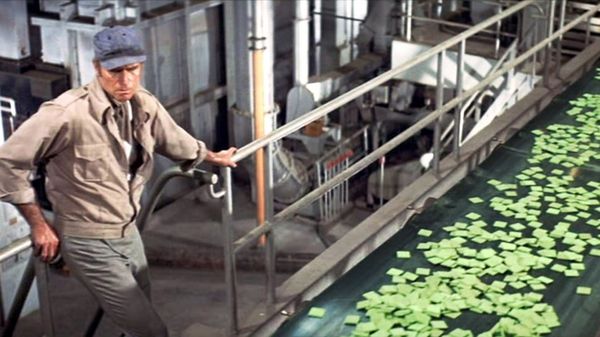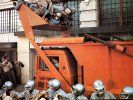Eye For Film >> Movies >> Soylent Green (1973) Film Review
Soylent Green
Reviewed by: Jennie Kermode

In 2050, leading scientists estimate, humanity will hit its peak population, with 15 billion people competing for space. By then there will be less space to spare, with predicted sea level rises eating away at islands and the edges of continents - and, notably, due to the destruction of arable land there will very likely be less food.
Soylent Green is set in 2022. In its vision of the future, 40 million people live in New York City alone, and they are starving. Global warming and pollution have conspired to destroy not only farmland but most plant life on Earth. The only available food - at least for the poor - comes from the fantastically powerful Soylent corporation. There are soylent red and soylent yellow, little wafers apparently made from high energy vegetable concentrate. And there's soylent green, the new flavour on the block, whose better taste and higher nutritional value has made it immensely popular. But all the soylent products are in short supply, and demand frequently leads to riots. These are policed by the terrifying scoops - giant vehicles which roll into (and, if necessary, over) the crowds, scooping up people and carrying them away.

Within this troubled world, detective Robert Thorn (Charlton Heston) goes about his business and tries to keep his head down. He shares an apartment with the elderly Sol (Edward G Robinson), an intellectual who tries to interest him in stories of the world as it was, but he's disinclined to believe these. Then one day he is asked to investigate the murder of a wealthy man who turns out to have been high up in the Soylent corporation, and everything changes. He is on his way to uncovering a secret that will undermine everything he believes in.
Most of the strengths of this film come directly from the book it is based on, Harry Harrison's Make Room! Make Room! - a book which seems a lot less like fantasy than it did in 1973. Harrison's future world is complete in every detail and has been perfectly transferred to the screen, with the screenwriter's extra flourishes fitting in well. With such a powerful story and a charismatic lead like Heston, it's hard to go wrong. Add to this a stunning performance by Robinson - his swansong, made all the more poignant by what happens to his character and the fact he told Heston about his cancer just moments before their climactic scene together. It's Robinson who brings humanity to the film, reminding us of what being human once meant and what - in our own world - it still could.
Richard Fleischer is not the strongest of directors and tends to take his lead from Harrison rather than displaying much vision of his own, but once you've seen it, his startling depiction of the scoops doing their work will be etched on your eyeballs forever. Given the increasing violence used in crowd control in western countries, this is perhaps the most chilling of the film's warnings. Too much of what Fleischer depicts relies on our existing expectations of science fiction films and on our willingness to buy in to Heston as hero with little elaboration, but what the film does, it does well, and there's good reason why its final lines have gained such iconic status. If you're one of the few people who doesn't know the ending yet, I won't spoil it for you. Just don't take a hot dog with you when you go to see it.
Reviewed on: 18 Jun 2009

















